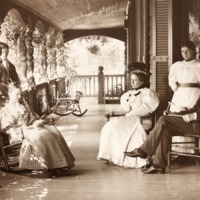Francese Litchfield Turnbull (1845-1927)

Francese Hubbard Litchfield Turnbull was the WLCB’s first president and did much to shape its values and mission. In her first address to the club as president, in April 1890, she declared that the Club was “formed to encourage exact and noble thinking among our women; hoping to prove that added strength will cultivate larger grace of speech and manner, keener instincts of pure womanhood, a deeper appreciation of the precious opportunities of the home life, with a truer comprehension of its responsibilities–a broader, and not less loving and believing heart.” In subsequent years, she firmly guided the Club toward these aims of aesthetic appreciation, literary cultivation, and intellectual pursuits in lieu of social reform and philanthropy. As president, Turnbull was a frequent presenter, by which she asserted her involvement as well as her authority within the Club. She helped create an environment in which both successful and fledgling writers flourished.
Turnbull, who was educated privately in both the United States and in Europe, married Baltimore attorney Lawrence Turnbull in 1871. Turnbull and her husband were admirers and friends of the Southern poet Sidney Lanier, and were instrumental in his appointment to a position at the Johns Hopkins University as a lecturer on poetry after his enlistment in the Confederate Army during the Civil War. Following the deaths of Lanier in 1881 and their son Percy in 1887, they established the Percy Turnbull Lectures in Poetry at Johns Hopkins University in 1889, which brought poets such as T. S. Eliot and W. H. Auden to Baltimore.
Turnbull’s first publication was a narrative poem, Marguerite’s Vow (1882), but the remainder of her writing was prose: historical fiction and several pieces of literary criticism, much of which were initially presented at Club meetings. Her first novel, The Catholic Man (1890), centers on a character based on Lanier, a Confederate officer who is taken in by a Northen family during his convalescence and imbues them with his poetic “soul”; a literary attempt to effect a reconciliation between North and South. Female characters appear in all of her work, gradually transforming from domestic paragons and admirers of male authority figures to leaders in their own right.
Relation
Lawrence Turnbull
Contributors
Jill Fury, Cynthia Requardt